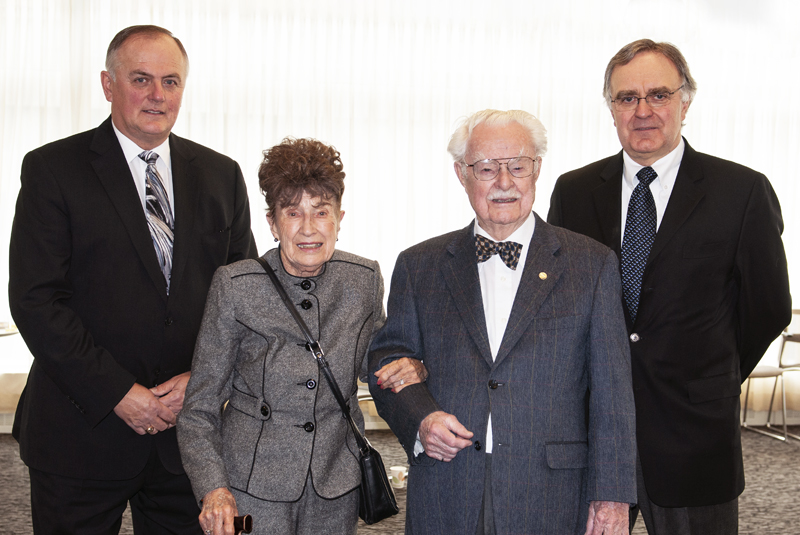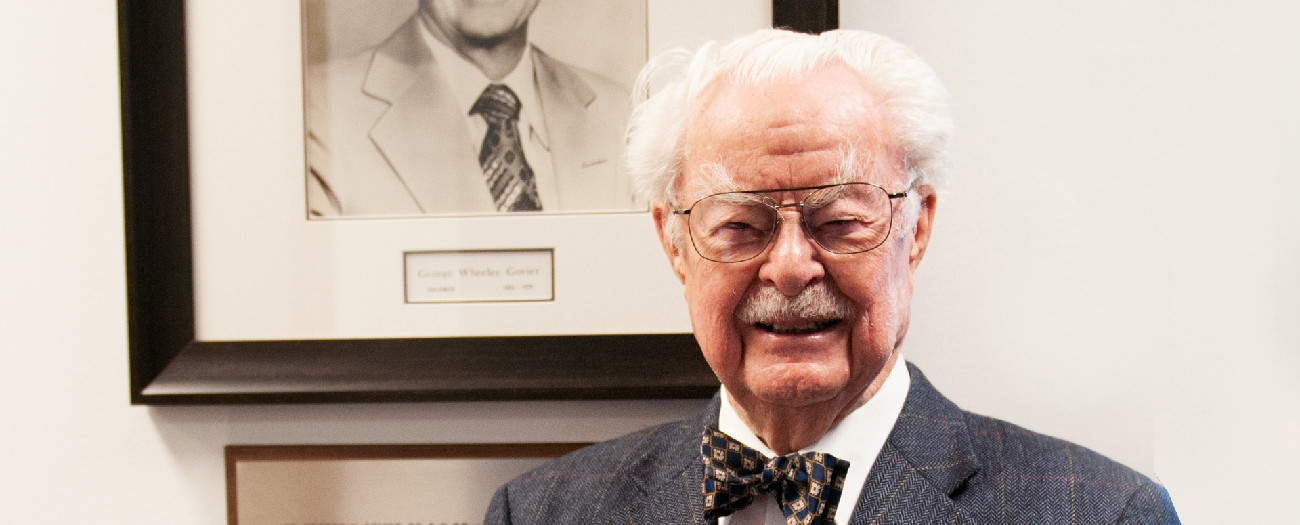Dr. George Govier was an architect of energy regulation in Alberta
Alberta - July 30, 2018The Government of Alberta had had enough. In July 1938—as oil companies in the Turner Valley area of Alberta systematically flared off what then was considered worthless natural gas at alarming rates—the province created the first regulator to seize the reigns of runaway oil and gas development.
Eight decades later, the Alberta Energy Regulator (AER) continues to fulfill the watchdog role, ensuring that energy development happens responsibly, that the public and the environment are protected, and that the province’s valuable resources are not wasted.
Getting to where we are today took time, hard work, and vision. One visionary in particular, Dr. George Govier – who passed away in 2016 – is widely recognized as a founding father of energy regulation in Alberta.

A Unique Expertise
Neil McCrank, who served as chairman of Energy Resources Conservation Board (an AER predecessor) from 1998 to 2007, notes that Govier “dramatically enhanced” the development of Alberta’s natural resources and helped build a highly respected regulator whose model has been replicated the world over.
“Dr. Govier was a giant among regulators,” says McCrank. “He had a unique combination of technical expertise as a former dean of engineering at the University of Alberta, government relations expertise as a former deputy minister of Alberta Energy, and awareness of the importance of responsible energy development in the public interest.”
As Alberta recognizes 80 years of energy regulation this summer, we look to an excerpt about Govier from Steward, a book commissioned to mark 75 years of energy regulation in Alberta.
Peter Lougheed never forgot his first contact as Alberta premier with the provincial Energy Resources Conservation Board (ERCB). After his party’s breakthrough victory in the 1971 election, he was enjoying the garden of his southwest Calgary house — but not picking daisies. Rather, he was selecting Alberta’s first Conservative cabinet for the government swearing-in ceremony when ERCB chairman George Govier strode into the backyard.
“It was just so startling to me,” Lougheed recalled in an interview four decades later. Far from feeling intruded upon, he was honoured by Govier’s visit, he added. “He was so highly regarded.”
Govier dropped by because he needed to know whether he should keep an imminent date in Poland for a conference of regulatory chiefs from around the world. Would the new Conservative regime want an appointee of the old Social Credit government to represent Alberta on the world stage?
“We would not have changed that,” Lougheed said. “I had no idea that we belonged to an international network of regulators, like a cartel. I was surprised. It was a shock.” But he could think of no agency or official more fitting to represent the province abroad. The ERCB and its chairman, he said, exuded “credibility that really gets your attention.” …
… George Govier, the ERCB’s longest-serving and best-known leader, joined the ERCB in 1948 and chaired it from 1962 to 1978. A plaque at the entrance to the custom-built hearing room at the agency’s downtown Calgary headquarters, Govier Hall, reminds all who pass of his contributions to the orderly development of oil and gas in Alberta. He is the man widely heralded for instilling the culture of responsibility, discipline, constructive regulation, realism, and adaptability that prevails at the ERCB to this day.
Under the leadership of Lougheed’s backyard visitor, the ERCB’s role as a builder of Alberta crystallized into a creed that emphasized the operative word in the ERCB’s name — conservation — as a matter of public interest or trust. The concept has the broadest possible meaning: making the most of the province’s resource endowment for the benefit of all Albertans.
“Government’s responsibility is on behalf of the people whether they share in actual ownership of the resources or not,” said Govier in a paper he presented to the petroleum section of the Canadian Institute of Mining Engineers in 1968.
“Even without a direct ownership interest, society at large has a legitimate interest in seeing that the natural resources are developed without waste. Industry shares the conservation responsibility first as a responsible member of society, to whom the privilege of developing the resources has been granted, and secondly in its own good business interest.” …
Meet George Govier
… Born in 1917, he’s descended from Huguenots, who took refuge in England from persecution as the Protestant minority in France then migrated to Canada, at first as Ontario farmers and boat builders. Govier’s branch of the family rode the roller coaster of the Great Depression and recovery in the West. His father, George Arthur Govier, built up a thriving general store south of Calgary in Nanton and repeated the feat on a larger scale in warmer southern British Columbia at Penticton until hard times sank the business. The family made a comeback in Vancouver. The elder Govier became a haberdasher when men’s hats were a fashion must.
On the long path to a PhD in engineering, the future ERCB chairman got his introduction to the oil industry doing shift work at a refinery in the Vancouver suburb of Burnaby. “It was not a sophisticated training program,” he recalled. “I cut weeds, cleaned oil drums, and did a lot of manual labour. I learned a lot though, about people. I learned what the labour employees thought of management. I learned to respect people who were doing ordinary jobs. I learned those jobs were important. Maybe weed cutting wasn’t, but cleaning oil barrels was. The experience helped me try to create an atmosphere of mutual respect at the board.”
Resource Editor


